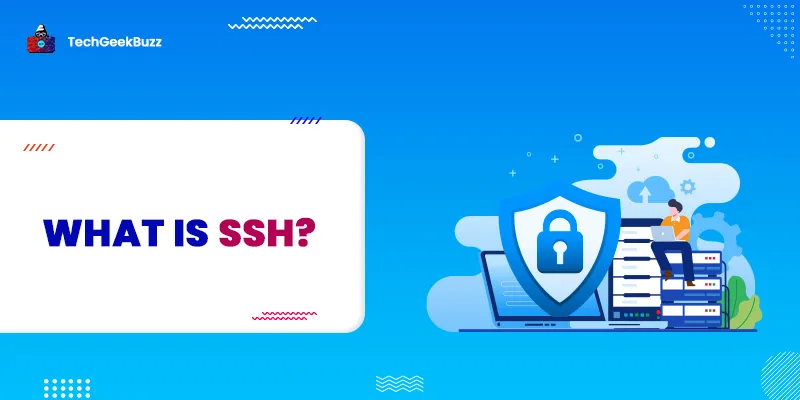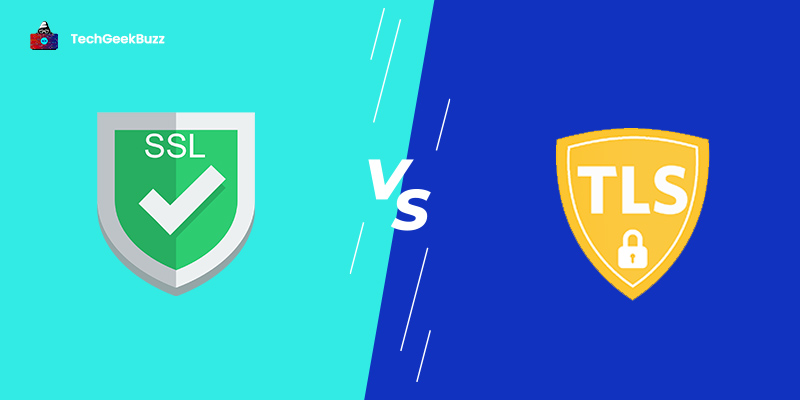Today, we can easily share data by connecting to other systems present in the same network. However, we need to ensure that the connection with the network is safe and secure, as this will help to maintain the integrity of the transferred data. For that, we can take several measures, and the use of SSH is one of them. SSH or Secure Shell is a network protocol that helps to establish a secure connection between devices that are part of an unsecured network.
It ensures that both the sending and receiving parties share some agreement on how they will communicate securely. SSH is basically a protocol for the application layer, which is the seventh layer of the OSI model . In this article, we will focus on what SSH is, how it works, its features as well as its advantages and disadvantages.
What is SSH?
SSH is a cryptographic protocol for the network that is mainly used by system administrators for securely accessing a system over an unsecured network. SSH offers strong authentication and encrypts the data transferred between two systems that are being connected over an open network.
You can consider SSH as a secured alternative to other non-protected login protocols like telnet and FTP. SSH can be referred to as the suite of utilities that will implement the protocol. The SSH server uses TCP port 22. SSH is an ideal solution for remotely accessing systems over the internet.
With SSH, you will be able to control servers remotely. SSH was introduced for the first time in the 90s and designed as a replacement for telnet. Earlier, Telenet was also used as an application layer protocol that could transfer data without encryption. Telnet transfers data in plain text, making it vulnerable and more prone to attacks as the data is easily visible to attackers.
On the other hand, SSH uses encryption for hiding the data, so it is not human-readable unless you decrypt the data. SSH ensures secure communication by encrypting the data. It works on the client-server model, where one system is considered to be the SSH client, and the other is the SSH server.
Uses of SSH protocol
You can use the SSH protocol in the corporate networks for the following tasks:
- To provide secure access for many users and automated tasks running on the server.
- To allow interactive and automated file transfers.
- To issue remote commands.
- To manage the network infrastructure and other related mission-critical system components.
- To solve connectivity issues and ensure the security of cloud-based VMs.
How Does SSH work?
SSH helps to break down the data that needs to be transferred into small series of packets. While transferring the data, there are some fields that come at the beginning of the packet are shown in the below image.
-
Packet
In the above image, you can see the packet length, which specifies the length of the packet. After that, there is a padding amount, specifying how much the padding is for the packet. Then comes the data called payload, which is the main data. Then there is another padding after the data, which is a combination of random bytes indicating the encrypted data along with the payload. Finally, there is a message authentication code, which ensures that your data cannot be tampered with.
-
Encrypted Packet
The packet will be sent to the server, where it is decrypted and decompressed to extract the actual data. This process of encryption and decryption is done for all packets sent over the network. SSH uses three different data manipulation methods during transmission, namely symmetrical encryption, asymmetrical encryption, and hashing.
Advantages of SSH
Below are the advantages of using SSH protocol for your application layer:
- SSH comes with remote server control, allowing users to manage various tasks like data configuration, data transfer, app installation, and many more.
- By using strong technologies like public-key cryptography, it ensures the security of the network giant spoofing, IP source routing, and DNS spoofing efficiently. If any hacker tries to enter your network, SSH will terminate the connection for them.
- It uses a powerful authentication system that will efficiently filter out hackers and malicious activities from the network.
Disadvantages of SSH
Below are some risks associated with SSH:
- If you have enabled SSH server access on any system where it is not required, the system is likely to get exposed to various attacks as hackers will have a chance to gain access remotely to those servers.
- If the SSH client and server are not updated with the latest tools and fixes, your system may get exposed to attackers.
- While configuring the public key authentication, you will require a private key to gain access. If your private key is being compromised, then it will leave your system more vulnerable. There can be various causes that will make your private key at risk, like careless users and weak private keys.
Features of SSH
Below are the key features of SSH:
- Unlike telnet, SSH does not transmit the username and password for login over the network. Instead of using the insecure telnet program, you can use the SSH client program to login into your system with a username.
- It helps in transferring files and other messages securely over a network. Also, it encrypts files and transfers them in the traditional way, and the receiver can decrypt the file.
- It helps in executing the commands on remote servers in a secure manner.
Strong authentication with SSH keys
For implementing the user authentication measures, you can use the most commonly used methods like passwords and public key authentication. Also, you can leverage the public key authentication for automation and enable single sign-on. The main concept is to have a cryptographic key pair (public and private key). It is easy to configure the public key for a server to authorize user access.
Moreover, you can even grant it to someone who has a copy of the private key to access that server. These keys are called SSH keys. It is mainly used for implementing secure automation.
Strong Encryption and Integrity Protection
After establishing a connection between the SSH server and the client, the data is encrypted before being transmitted. This encryption is based on some parameters that are already negotiated during the setup. During the negotiation, both the client and the server agree on an encryption algorithm for generating the encryption key. In addition, the traffic between both parties is protected using standard industrial encryption algorithms. Also, SSH uses hash algorithms to ensure the integrity of the transferred data.
Conclusion
SSH is a secure way for transferring crucial files and data over the internet and is an expansion to the telnet program. It is considered to be the most secure and efficient protocol to transfer data and access systems remotely. Also, it transfers data over an unsecured network without compromising the security of the data. It implements various security measures to protect your data from attackers who are looking to gain unauthorized access.
So, you must understand the importance and concept of SSH and implement it within your organization.
People are also reading:




